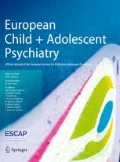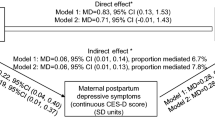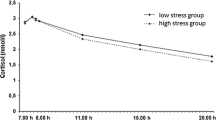Abstract
Prenatal maternal depression is associated with developmental disorders in offspring. However, the specific effects of the intensity of prenatal depressive symptoms on infant behavior remain poorly explored. The aim of this work is to explore the links between early neonatal behavior and maternal prenatal depressive symptoms, independently from maternal pre- and postnatal anxiety and early postnatal maternal depressive symptoms. Five hundred and ninety-eight women and their newborns from the MATQUID cohort were prospectively evaluated during the 8th month of pregnancy (T1) and at day 3 postpartum (T2). We analyzed the independent associations between neonates’ behavior (Neonatal Behavioral Assessment Scale—NBAS) at T2 and the intensity of maternal prenatal depressive symptoms (CES-D), taking into account confounding factors including depressive symptoms at T2 and anxiety (T1 and T2). The presence of a major depressive episode (MDE) based on MINI at T1 was also studied, independently. Our results show a significant negative correlation between prenatal CES-D scores and NBAS scores on “habituation” (p = 0.0001), “orientation” (p = 0.015), “motor system” (p < 0.0001), “autonomic stability” (p < 0.0001) dimensions, independently of other variables, including pre/postnatal anxiety and postnatal depressive symptoms. A prenatal MDE was independently associated with lower scores on the “orientation” dimension (p = 0.005). This study reports a specific effect of prenatal depressive symptoms on newborn’s behavior. These results highlight the crucial necessity for antenatal screening and adjusted treatments of maternal depressive symptoms and not only of MDE. Particular attention must be paid to infants of mothers presenting prenatal depressive symptoms to provide them with early developmental care when necessary.


Similar content being viewed by others
References
Howard LM, Molyneaux E, Dennis CL, Rochat T, Stein A, Milgrom J (2014) Non-psychotic mental disorders in the perinatal period. Lancet 384:1775–1788
Gaynes BN, Gavin N, Meltzer-Brody S, Lohr KN, Swinson T, Gartlehner G, Brody S, Miller WC (2005) Perinatal depression: prevalence, screening accuracy, and screening outcomes. Evid Rep Technol Assess (Summ) 119:1–8
Stein A, Pearson RM, Goodman SH, Rapa E, Rahman A, McCallum M, Howard LM, Pariante CM (2014) Effects of perinatal mental disorders on the fetus and child. Lancet 384:1800–1819
Tuovinen S, Lahti-Pulkkinen M, Girchenko P, Lipsanen J, Lahti J, Heinonen K, Reynolds RM, Hämäläinen E, Kajantie E, Laivuori H, Pesonen AK, Villa PM, Räikkönen K (2018) Maternal depressive symptoms during and after pregnancy and child developmental milestones. Depress Anxiety 35:732–741
Ruisch IH, Buitelaar JK, Glennon JC, Hoekstra PJ, Dietrich A (2018) Pregnancy risk factors in relation to oppositional-defiant and conduct disorder symptoms in the Avon Longitudinal Study of Parents and Children. J Psychiatr Res 101:63–71
Velders FP, Dieleman G, Henrichs J, Jaddoe VW, Hofman A, Verhulst FC, Hudziak JJ, Tiemeier H (2011) Prenatal and postnatal psychological symptoms of parents and family functioning: the impact on child emotional and behavioural problems. Eur Child Adolesc Psychiatry 20(7):341–350
Robinson M, Oddy WH, Li J, Kendall GE, de Klerk NH, Silburn SR, Zubrick SR, Newnham JP, Stanley FJ, Mattes E (2008) Pre- and postnatal influences on preschool mental health: a large-scale cohort study. J Child Psychol Psychiatry 49:1118–1128
Madigan S, Oatley H, Racine N, Fearon RMP, Schumacher L, Akbari E, Cooke JE, Tarabulsy GMA (2018) A meta-analysis of maternal prenatal depression and anxiety on child socioemotional development. J Am Acad Child Adolesc Psychiatry 57:645–657
Field T (2011) Prenatal depression effects on early development: a review. Infant Behav Dev 34:1–14
Graignic-Philippe R, Dayan J, Chokron S, Jacquet AY, Tordjman S (2014) Effects of prenatal stress on fetal and child development: a critical literature review. Neurosci Biobehav Rev 43:137–162
Oberlander TF, Weinberg J, Papsdorf M, Grunau R, Misri S, Devlin AM (2008) Prenatal exposure to maternal depression, neonatal methylation of human glucocorticoid receptor gene (NR3C1) and infant cortisol stress responses. Epigenetics 3:97–106
Toffol E, Rantalainen V, Lahti-Pulkkinen M, Girchenko P, Lahti J, Tuovinen S, Lipsanen J, Villa PM, Laivuori H, Hämäläinen E, Kajantie E, Pesonen AK, Räikkönen K (2019) Infant regulatory behavior problems during first month of life and neurobehavioral outcomes in early childhood. Eur Child Adolesc Psychiatry 28:847. https://doi.org/10.1007/s00787-018-1243-8(epub ahead of print)
Sutter AL, Murray L, Glatigny-Dallay E, Verdoux H (2003) Newborn behavior and risk of postnatal depression in the mother. Infancy 4:589–602
Abrams SM, Field T, Scafidi F, Prodromidis M (1995) Newborns of depressed mothers. Infant Ment Health J 16:233–239
Diego MA, Field T, Hernandez-Reif M, Cullen C, Schanberg S, Kuhn C (2004) Prepartum, postpartum, and chronic depression effects on newborns. Psychiatry 67:63–80
Field T, Diego MA, Dieter J, Hernandez-Reif M, Schanberg S, Kuhn C, Yando R, Bendell D (2001) Depressed withdrawn and intrusive mothers’ effects on their fetuses and neonates. Infant Behav Dev 24:27–39
Field T, Diego MA, Dieter J, Hernandez-Reif M, Schanberg S, Kuhn C, Yando R, Bendell D (2004) Prenatal depression effects on the fetus and the newborn. Infant Behav Dev 27:216–229
Gerardin P, Wendland J, Bodeau N, Galin A, Bialobos S, Tordjman S, Mazet P, Darbois Y, Nizard J, Dommergues M, Cohen D (2011) Depression during pregnancy: is the developmental impact earlier in boys? A prospective case–control study. J Clin Psychiatry 72:378–387
Goodman SH, Rouse MH, Long Q, Ji S, Brand SR (2011) Deconstructing antenatal depression: what is it that matters for neonatal behavioral functioning? Infant Ment Health J 32:339–361
Lundy B, Jones N, Field T, Nearing G, Davalos M, Pietro P, Schanberg S, Kuhn C (1999) Prenatal depression effects on neonates. Infant Behav Dev 22:121–137
Pacheco A, Figueiredo B (2012) Mother's depression at childbirth does not contribute to the effects of antenatal depression on neonate's behavioral development. Infant Behav Dev 35:513–522
Figueiredo B, Pinto TM, Pacheco A, Field T (2017) Fetal heart rate variability mediates prenatal depression effects on neonatal neurobehavioral maturity. Biol Psychol 123:294–301
Osborne S, Biaggi A, Chua TE, Du Preez A, Hazelgrove K, Nikkheslat N, Previti G, Zunszain PA, Conroy S, Pariante CM (2018) Antenatal depression programs cortisol stress reactivity in offspring through increased maternal inflammation and cortisol in pregnancy: the Psychiatry Research and Motherhood—Depression (PRAM-D) Study. Psychoneuroendocrinology 98:211–221
Zhang H, Su Q, Yao D, Wang S, Dang S, Ding D, Zhu Z, Shao S, Li H (2017) Prolactin, a potential mediator of reduced social interactive behavior in newborn infants following maternal perinatal depressive symptoms. J Affect Disord 215:274–280
Lundy B, Field T, Pickens J (1996) Newborns of mothers with depressive symptoms are less expressive. Infant Behav Dev 19:419–424
Hernandez-Reif M, Field T, Diego M, Ruddock M (2006) Greater arousal and less attentiveness to face/voice stimuli by neonates of depressed mothers on the Brazelton Neonatal Behavioral Assessment Scale. Infant Behav Dev 29:594–598
Field T, Diego M, Hernandez-Reif M, Figueiredo B, Schanberg S, Kuhn C (2007) Sleep disturbances in depressed pregnant women and their newborns. Infant Behav Dev 30:127–133
Goodman SH, Tully EC (2009) Recurrence of depression during pregnancy: psychosocial and personal functioning correlates. Depress Anxiety 26:557–567
Verdoux H, Sutter AL, Glatigny-Dallay E, Minisini A (2002) Obstetrical complications and the development of postpartum depressive symptoms: a prospective survey of the MATQUID cohort. Acta Psychiatr Scand 106:212–219
Spanier GB (1976) Measuring dyadic adjustment: new scales for assessing the quality of marriage and similar dyads. J Marriage Fam 38:15–28
Baillargeon J, Dubois G, Marineau R (1986) Traduction française de l'Échelle d'ajustement dyadique. Can J Behav Sci 18:25–34
Radloff L (1977) The CES-D scale: a self-report depression scale for research in the general population. Appl Psychol Meas 1:385–401
Fuhrer R, Rouillon F (1989) La version française de l'échelle CES-D (Center for Epidemiologic Studies-Depression Scale). Description et traduction de l'échelle d'autoévaluation. Psychiatr Psychobiol 4:163–166
Sheehan DV, Lecrubier Y, Sheehan KH, Amorim P, Janavs J, Weiller E, Hergueta T, Baker R, Dunbar GC (1998) The Mini-International Neuropsychiatric Interview (M.I.N.I.): the development and validation of a structured diagnostic psychiatric interview for DSM-IV and ICD-10. J Clin Psychiatry 59:22–33
De Bonis M (1973) Etude de l’anxiété par la méthode des questionnaires, problèmes généraux. Revue Psychol Appl 23:31–47
Brazelton TB, Nugent JK (1995) Neonatal behavioral assessment scale, 3rd edn. Mac Keith Press, London
Yang X, Belin TR, Boscardin WJ (2005) Imputation and variable selection in linear regression models with missing covariates. Biometrics 61:498–506
Cohn JF, Campbell SB, Matias R, Hopkins J (1990) Face-to-face interactions of postpartum depressed and nondepressed mother–infant pairs at 2 months. Dev Psychol 26:15–23
Barker DJP (2004) The developmental origins of adult disease. J Am Coll Nutr 23:588S–595S
Glover V (2014) Prenatal stress and its effects on the fetus and the child: possible underlying biological mechanisms. Perinatal programming of neurodevelopment. Springer Science + Business Media, New York
Räikkönen K, Pesonen AK, O'Reilly JR, Tuovinen S, Lahti M, Kajantie E, Villa P, Laivuori H, Hämäläinen E, Seck JR, Reynolds RM (2015) Maternal depressive symptoms during pregnancy, placental expression of genes regulating glucocorticoid and serotonin function and infant regulatory behaviors. Psychol Med 45:3217–3226
Sostek AM, Anders TF (1977) Relationships among the Brazelton Neonatal Scale, Bayley Infant Scales and early temperament. Child Dev 48:320–323
Tirosh E, Harel J, Abadi J, Berger A, Cohen A (1992) Relationship between neonatal behavior and subsequent temperament. Acta Paediatr 81:829–831
Vaughn B, Taraldson B, Crichton L, Egeland B (1980) Relationships between neonatal behavioral organization and infant behavior during the first year of life. Infant Behav Dev 3:47–66
Risholm-Mothander P (1989) Predictions of developmental patterns during infancy: assessments of children 0–1 years. Scand J Psychol 30:161–167
Canals J, Esparó G, Fernández-Ballart JD (2006) Neonatal behaviour characteristics and psychological problems at 6 years. Acta Paediatr 95:1412–1417
Canals J, Hernández-Martínez C, Esparó G, Fernández-Ballart J (2011) Neonatal Behavioral Assessment Scale as a predictor of cognitive development and IQ in full-term infants: a 6-year longitudinal study. Acta Paediatr 100:1331–1337
Leigh B, Milgrom J (2008) Risk factors for antenatal depression, postnatal depression and parenting stress. BMC Psychiatry 8:24
Peyre H, Albaret JM, Bernard JY, Hoertel N, Melchior M, Forhan A, Taine M, Heude B, De Agostini M, Galéra C, Ramus F, EDEN Mother-Child Cohort Study (2019) Developmental trajectories of motor skills during the preschool period. Eur Child Adolesc Psychiatry 78:89. https://doi.org/10.1007/s00787-019-01311-x(epub ahead of print)
Ibanez G, Bernard JY, Rondet C, Peyre H, Forhan A, Kaminski M, Saurel-Cubizolles MJ, EDEN Mother-Child Cohort Study Group (2015) Effects of antenatal maternal depression and anxiety on children's early cognitive development: a prospective cohort study. PLoS One 10:e0135849
Higley AM, Morin KH (2004) Behavioral responses of substance-exposed newborns: a retrospective study. Appl Nurs Res 17:32–40
Molteno CD, Jacobson JL, Carter RC, Dodge NC, Jacobson SW (2014) Infant emotional withdrawal: a precursor of affective and cognitive disturbance in fetal alcohol spectrum disorders. Alcohol Clin Exp Res 38:479–488
Thibaut F, Chagraoui A, Buckley L, Gressier F, Labad J, Lamy S, Potenza MN, Rondon M, Riecher-Rössler A, Soyka M, Yonkers K (2019) WFSBP and IAWMH guidelines for the treatment of alcohol use disorders in pregnant women. World J Biol Psychiatry 20:17–50
Oberlander TF, Warburton W, Misri S, Aghajanian J, Hertzman C (2006) Neonatal outcomes after prenatal exposure to selective serotonin reuptake inhibitor antidepressants and maternal depression using population-based linked health data. Arch Gen Psychiatry 63:898–906
Figueiredo B, Pacheco A, Costa R, Conde A, Teixeira C (2010) Mother's anxiety and depression during the third pregnancy trimester and neonate's mother versus stranger's face/voice visual preference. Early Hum Dev 86:479–485
Author information
Authors and Affiliations
Corresponding author
Ethics declarations
Conflict of interest
Regarding potential conflicts of interest, all of them were indirect: F. Gressier has given talks for Eisai, Lundbeck and Servier and received a Grant from Servier for a postdoctoral degree (2011–2012). B. Falissard has been a consultant, expert or has given talks for E. Lilly, BMS, Servier, Sanofi, GlaxoSmithKline, HRA, Roche, Boeringer Ingelheim, Bayer, Almirall, Allergan, Stallergene, Genzyme, Pierre Fabre, Astra Zeneca, Novartis, Janssen, Astellas, Biotronik, Daiichi-Sankyo, Gilead, MSD, and Lundbeck. A. Letranchant, E. Glatigny-Dallay and A. L. Sutter-Dallay report no financial relationships with commercial interests.
Rights and permissions
About this article
Cite this article
Gressier, F., Letranchant, A., Glatigny-Dallay, E. et al. Negative impact of maternal antenatal depressive symptoms on neonate’s behavioral characteristics. Eur Child Adolesc Psychiatry 29, 515–526 (2020). https://doi.org/10.1007/s00787-019-01367-9
Received:
Accepted:
Published:
Issue Date:
DOI: https://doi.org/10.1007/s00787-019-01367-9




